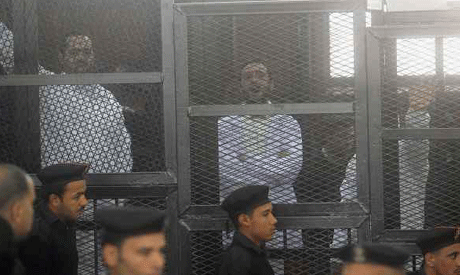 An Egyptian misdemeanour court sentenced on Sunday three leading Egyptian activists to three years in jail and an LE50,000 fine each for charges including organising illegal protests, judicial sources told Ahram Online.
An Egyptian misdemeanour court sentenced on Sunday three leading Egyptian activists to three years in jail and an LE50,000 fine each for charges including organising illegal protests, judicial sources told Ahram Online.
Founder of April 6 Youth movement Ahmed Maher, member Mohamed Adel and long-time activist Ahmed Douma stand charged of allegedly assaulting police officers during a demonstration outside a Cairo court where Maher was handing himself in for questioning over allegations he had organised an illegal protest.
The activists, known for being at the forefront of Egypt's 2011 uprising that toppled former autocrat Hosni Mubarak, are accused of joining a protest without seeking a police permit as required by a new disputed protest law.
As the sentences were pronounced, they chanted "down, down with military rule" from the dock at the courtroom in central Cairo.
The case has fuelled fears of an expanding crackdown on opposition by the country's interim authorities, beyond a sustained campaign on Islamists since the army's July ouster of president Mohamed Morsi amid massive protests against his troubled one-year rule.
The defendants, who will additionally be placed on a three-year probation period after serving their terms, can still appeal the ruling.
The Cairo-based Arab Organization for Human Rights condemned the sentence saying it contradict the spirit of the 25 January and 30 June revoultions. The group said it would represent the defendants in an appeal of the verdict and called on the prosecutor-general to release all three on bail in the time being.
April 6 spokesman Khaled El-Masry argued the verdict has no legal basis and that it was a clear "revenge against the 25 January 2011 Revolution."
"If this were a fair trial, they wouldn't have spent one hour in jail," he told Ahram Online.
El-Masry vowed the movement would take all necessary legal action to appeal the ruling, saying the group will carry on protesting without seeking prior permits from authorities in defiance of the controversial protest law.
The passing of the protest law on 24 November -- nearly 10 days after a three-month state of emergency, in place since the July ouster of Islamist president Mohamed Morsi, was lifted -- had been viewed by rights activists as an alternative tool for crackdown on public dissent.
It requires protest organisers to seek authorisation three days ahead of any planned demonstration. Protests can be banned if deemed a threat to national security.
"We do not acknowledge this law. It's a failure; if you turn the television on you will see people protesting everywhere," he concluded.
Member of the Nasserist Popular Current movement Emad Hamdi expressed his astonishment at the verdict, highlighting his total support of the three prominent revolutionary figures.
"When I see someone like Ahmed Shafiq from the Mubarak regime pronounced innocent in many of the allegations levelled against him, while those three revolutionary figures receive a sentence of three years in prison, then something is definitely wrong," said Hamdi.
Meanwhile, speaking to the press after the announcement of the verdict against the three activists, Mostafa Maher, brother of April 6 founder Ahmed Maher, accused the interim regime of following the path of past regimes by defaming "the revolution's revolutionaries and symbols" and fabricating facts, adding that it might face a fate similar to that of Mubarak soon.
Prominent activist Alaa Abdel-Fattah, another symbol of the 2011 revolt, has also been detained over allegations he organised, along with Maher, an illegal protest against military trials for civilians in November.
Abdel-Fattah is currently facing trial for breaking the protest law and assaulting police officers.
In November, a harsh 11-year sentence handed down to 14 Islamist women supporters of toppled president Morsi sparked public outcry before an appeal judge reduced the verdict to a one-year suspended sentence for each, allowing the defendants to walk free.



